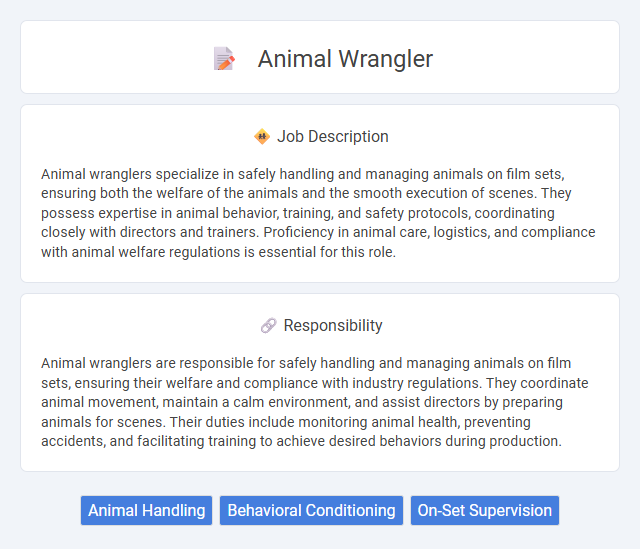
Animal wranglers specialize in safely handling and managing animals on film sets, ensuring both the welfare of the animals and the smooth execution of scenes. They possess expertise in animal behavior, training, and safety protocols, coordinating closely with directors and trainers. Proficiency in animal care, logistics, and compliance with animal welfare regulations is essential for this role.
People who enjoy working outdoors and have a strong affinity for animals are probably well-suited for a career as an animal wrangler. Those with physical stamina and the ability to remain calm under pressure will likely find this job more manageable. Individuals uncomfortable with unpredictable animal behavior or strenuous tasks may find this role challenging.
Qualification
An animal wrangler requires extensive knowledge of animal behavior, safety protocols, and handling techniques to ensure the well-being of animals on set. Essential qualifications include experience in animal training, familiarity with species-specific care, and certifications such as Animal Welfare and First Aid. Strong communication skills and the ability to collaborate with directors and veterinarians are critical for managing animals in dynamic filming environments.
Responsibility
Animal wranglers are responsible for safely handling and managing animals on film sets, ensuring their welfare and compliance with industry regulations. They coordinate animal movement, maintain a calm environment, and assist directors by preparing animals for scenes. Their duties include monitoring animal health, preventing accidents, and facilitating training to achieve desired behaviors during production.
Benefit
Working as an animal wrangler likely offers benefits such as hands-on experience with diverse animal species and opportunities to work in dynamic environments like film sets or wildlife reserves. There is a probable advantage in developing specialized skills in animal behavior and safety protocols that can enhance career prospects in animal training or veterinary fields. The role may also provide a chance for outdoor work and physical activity, contributing to overall job satisfaction for those passionate about animals.
Challenge
Working as an animal wrangler likely presents significant challenges related to managing unpredictable animal behavior and ensuring safety on set. The role probably demands quick problem-solving skills and a deep understanding of animal psychology to handle unexpected situations effectively. Physical stamina and patience may also be critical, given the need to work closely with diverse species in dynamic environments.
Career Advancement
Animal wranglers gain specialized skills in animal handling, safety protocols, and on-set coordination, paving the way for career advancement into roles such as animal trainer, handler supervisor, or animal welfare coordinator. Experience in diverse environments, including film production, television, and live events, enhances employability and opens opportunities for leadership positions. Continued education in animal behavior and certification can accelerate progression to expert consultant or stunt coordinator roles within the entertainment industry.
Key Terms
Animal Handling
Animal wranglers specialize in the safe and humane handling of animals on film, television, and commercial sets, ensuring that creatures perform as required while minimizing stress and risk. Their expertise includes behavioral training, understanding species-specific needs, and maintaining a controlled environment to promote animal welfare. Proficiency in animal handling techniques is essential for coordinating scenes that involve complex animal interactions, preserving both safety and natural behavior.
Behavioral Conditioning
An animal wrangler specializes in behavioral conditioning to train animals for film, television, and live performances, ensuring they perform specific actions safely and reliably on set. Techniques include positive reinforcement, desensitization, and gradual exposure to stimuli, tailored to each species' natural instincts and temperaments. Expertise in animal psychology and welfare standards is essential to achieve desired behaviors while maintaining ethical treatment and minimizing stress.
On-Set Supervision
Animal wranglers specialize in on-set supervision, ensuring the safety and well-being of animals during film and television productions. They manage animal handlers, coordinate training sessions, and monitor animal behavior to maintain a controlled environment. Their expertise minimizes risks and guarantees compliance with animal welfare regulations throughout the shoot.
 kuljobs.com
kuljobs.com